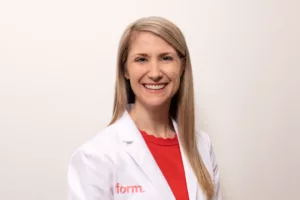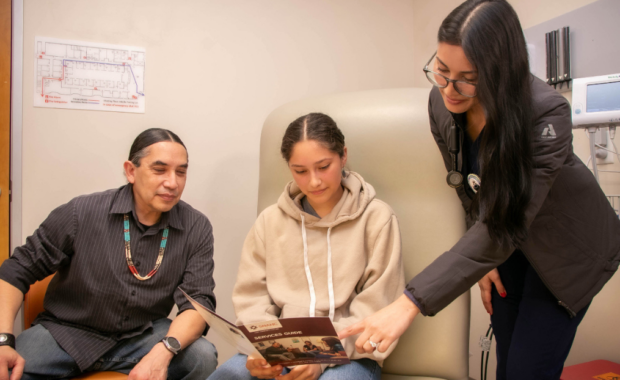Creating a Safe Space to Discuss Obesity with Patients, Experts Speak
Two Experts Share the Latest on Obesity Medicine
August 4, 2023
By Alex Morse
In a recent AAPA Huddle Ask Me session, two experts in obesity medicine answered questions on how to provide high-quality care to patients struggling with obesity, the effectiveness of anti-obesity medication, and how best to support patients who qualify for bariatric surgery.
In conjunction with this Ask Me session, AAPA is excited to introduce a new community on Huddle called Addressing Obesity: A Community of Practice. In this community, you can post questions and thoughts that will be responded to by other PAs who are passionate about addressing the obesity crisis. We invite you to join the community and discuss current and relevant research and evidence-based approaches to obesity care.
Brooke Marsico, PA-C, has been a PA since 2011 and has practiced in obesity medicine since 2016. She first became interested in helping people manage their weight and chronic conditions while in PA school at Midwestern University and wrote her Master’s capstone research project on “Lifestyle Interventions in the Management of Type 2 Diabetes.” After graduation, Brooke started her career in general medicine and had the opportunity a few years later to transition to practicing obesity medicine at Northwestern Memorial Hospital. After starting a family, she moved back to her home state of Ohio and continued her practice in obesity medicine by working with patients of the Bariatric and Metabolic Institute at Cleveland Clinic. In March of 2022, she joined FORM™, a research-backed medical weight loss program delivered entirely through telemedicine.
Brooke is passionate about helping patients living with obesity achieve meaningful weight loss and improve their health. She practices shared decision-making with her patients to develop a treatment plan that is individualized to them. Her practice focuses on behavioral and pharmacological intervention; however, she is also experienced in working with patients who have a history of bariatric surgery.
Nicole Fox, MPAS, PA-C, graduated from the University of Utah PA Program in 2018. Prior to becoming a PA, Nicole worked in international public health for several years. She completed a Fulbright grant in 2008, working with the World Health Organization to expand knowledge of parasite control programs in the Western Pacific Region. She also served as an American India Foundation Fellow for Service in Chennai, India, working to increase job opportunities for women impacted by HIV/AIDS.
Nicole currently practices rural family medicine and emergency medicine with San Juan Health in Southeast Utah. Her specific interests include obesity medicine, women’s health, and rural healthcare. She has completed the AAPA/TOS Obesity Management in Primary Care certificate program, as well as a PA Foundation Nutrition Fellowship. She is also director at large for PAs in Obesity Medicine (PAOM).

Creating a Safe Space to Discuss Obesity with Patients
Patients with obesity are less likely to seek medical care, and often feel stigmatized and judged about their weight. Fox and Marsico agree that establishing a good rapport and creating a safe environment in the medical office is crucial. “Similar to starting conversations to stop smoking, we need to assess how ready patients are to discuss this, and respect if s/he does not want to address this yet,” Fox says. She goes on to stress the importance of looking beyond a patient’s weight when evaluating other ailments, such as knee pain, to ensure there isn’t another underlying problem. Marsico also adds, “While losing weight can help a number of symptoms and conditions, always be sure to provide an appropriate and thorough evaluation just as you would for someone without obesity.”
AAPA’s Obesity Toolkit offers several great resources such as CME offerings, events and webinars, and other tools and resources for clinicians. In addition, Marsico recommends Rethink Obesity, which features modules created to help providers feel more confident starting a conversation and providing high-quality care to patients with obesity, and the STOP Obesity Alliance flowchart that can guide providers through a weight-related patient encounter.
Fox goes on to say, “By providing patient-centered care for all of a patient’s needs, that also opens the floor to discuss weight independently and with trust at a later appointment.”
[Earn free or discounted CME – join or renew your membership today]
Bariatric Surgery: How Best to Support Your Patients
As the decision to undergo weight loss surgery is nuanced and dependent on the patient’s past medical and surgical history, both experts agree that a PA’s role is to refer patients to a bariatric surgeon when they recognize a patient that might benefit from the surgery.
The American Society of Metabolic and Bariatric Surgery recommends bariatric surgery for the following groups:
- MBS is recommended for individuals with BMI ≥35 kg/m2, regardless of presence, absence, or severity of co-morbidities.
- MBS is recommended in patients with T2D and BMI ≥30 kg/m2.
- MBS should be considered in individuals with BMI of 30–34.9 kg/m2 who do not achieve substantial or durable weight loss or co-morbidity improvement using nonsurgical methods.
Marsico also stresses that when she discusses surgery with patients, she doesn’t present the gastric band as an option. “In my experience, gastric banding has the potential for complications with limited long-term success. Because of this, in the past eight years that I’ve been practicing in obesity medicine, I’ve seen more bands taken out than I have seen put in!” If a patient is only interested in the band, the appropriate action is to refer them to a surgeon or bariatric surgery program, and they can discuss the risks and benefits of bands and how other surgical options might compare.
The Use of Weight Loss Medication
GLP-1 medications, such as Ozempic and Wegovy, contain the same active ingredient (semaglutide), but have different indications. Ozempic is the brand name semaglutide used to treat diabetes (which has a side benefit of often facilitating significant weight loss), and Wegovy is FDA approved for treatment of obesity. Patients on these medications describe feeling more satisfied on smaller portions, less interested in snacking, and less interested in unhealthy foods.

Fox and Marsico agree that a single medication won’t work for everyone. When prescribing prescriptions to patients, it may require some trial and error to find the one that works best for them. Also, Marsico stresses that cost plays a large part in the future use of these medications, and may prevent patients, especially those without insurance, from benefiting from them. “I think that we will continue to have more effective medications for weight loss, which is fantastic, but if they’re not accessible for people due to cost or otherwise, then our ability to use them will be limited.”
The experts also agree that medication works best when paired with lifestyle changes. Fox never prescribes anti-obesity medications without setting SMART (specific, measurable, attainable, relevant, time-bound) goals for nutrition and exercise as well. “While medications address some of the underlying physiological complications of obesity, they must be supported with good nutrition and routine physical movement to be sustainable.”
[For more information on nutrition, check out AAPA’s Nutrition Toolkit]
When asked if gastric bypass patients are eligible to take GLP1’s, Marsico confirms that they are, and his patients who have tried it convey that the medication mimics how they first felt during their initial days after surgery. “I would advise caution if they already have some chronic GI issues from their surgery,” she says. “Patients who have a history of bariatric surgery may benefit from working with a provider who has obesity medicine experience, so I would encourage considering a referral to a specialist in that case.”
Addressing Obesity in Pediatric Patients
According to Fox, pediatric obesity is typically multifactorial, and genetics, family food security, cultural habits, and intergenerational trauma can all affect the weight of pediatric patients. “I try to get the whole family involved in nutrition and movement changes, because it’s really difficult for children to improve without other family members getting on board,” she says. “I like the 5210 Let’s Go! campaign from Maine Health, which focuses on healthy fruits and vegetables, decreased screen time, daily physical activity, and zero sugared beverages. They also have several excellent handouts to counsel parents about healthy portions, approaches to good nutrition, and physical movement for kids.”
The GLP-1 receptor, Wegovy, was recently approved for select pediatric patients between ages 12-18. However, Fox would recommend referring patients to a pediatric obesity specialist before prescribing the medication.
Additional Tools and Resources for Patients
Accountability is helpful for successful weight loss, and support groups can be an incredible resource for patients. Marsico has been fortunate to work for organizations that have support groups available to patients, so her referrals are usually within her organization. If you can’t make an internal referral, she suggests recommending outside programs such as Weight Watchers or Overeaters Anonymous.
In addition, there are also a number of online support groups that patients can join. Fox recommends the Obesity Action Coalition, which is evidence based and has plenty of online community resources.
When asked about how to decide the right calorie deficit for each patient, Marsico admitted that it is not a simple thing to decide. She recommends having patients track their calorie intake, then have them reduce that by 200-500 calories per day. “Keep in mind that reducing calorie intake will often lead to increases in appetite. So, cutting back more slowly may be best. Keeping protein intake high can help with managing appetite,” she says, and suggests referring to a Registered Dietitian who has experience in obesity medicine, as they can advise on how to reduce caloric intake while ensuring the patient is getting adequate nutrition.
Read the full Ask Me session online and be sure to check out AAPA’s Obesity Toolkit.
Alex Morse is AAPA’s Communications Associate. She can be reached at [email protected].
You May Also Like
Obesity Medicine PA Karli Burridge Finds Success with a New Approach
2022–2023 Obesity Management in Primary Care Training and Certificate Program
Insights into PAs’ Experiences Working with Patients with Obesity
Thank you for reading AAPA’s News Central
You have 2 articles left this month. Create a free account to read more stories, or become a member for more access to exclusive benefits! Already have an account? Log in.



